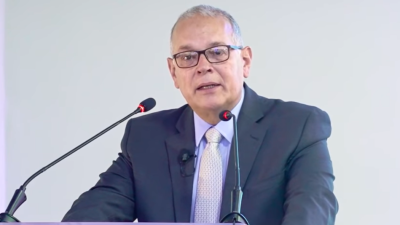José Luis Orella: "The degradation of the national community and society generates weaker, more impressionable and manageable people".
José Luis Orella is a lecturer in Contemporary History at the CEU San Pablo University, PhD in Contemporary History, specialising in political thought in Spain and Central Europe from the University of Deusto and in Political Law from the UNED. Author of numerous articles and more than 20 books, his publications include "Poland and Spain in late Modern and Contemporary Civilisation and Culture", "De fronteras hacia fuera: Polonia y España y sus aliados estratégicos y secundarios en el siglo XX" (From the frontiers outwards: Poland and Spain and their strategic and secondary allies in the twentieth century), and "De Le Pen a Le Pen".
What is your opinion of the current situation in Spain and do you think that what is happening was foreseen?
José Luis Orella: We can clearly see a process of acceleration. In education, we have seen that thanks to autonomous decentralisation, new generations have been formed without a sense of belonging, and this has favoured these egoisms, these nationalist oligarchies that for many years have been a hinge element in forming the government of the nation. Unfortunately, the national parties, when they have had absolute majorities, have not agreed to change an unfair electoral law that had its explanation during the transition, but whose disastrous results we can now see. A nationalist party at regional level has much greater representation than a national one with the same votes.
You talk about acceleration, what do you think has motivated it?
Before, there was a context that was called constitutional and there were limits, invisible barriers that nobody dared to cross. But now, if the Popular Party has bought the centrist agenda of Ciudadanos, we see that the PSOE has bought the agenda of Podemos, and what Podemos used to say is now being said by the main socialist leaders. So we have a horse race in which the nationalists want to arrive at the formation of sovereign states, and the Socialist Party wants to arrive at a kind of federalism. But if we take into account that autonomism is already a kind of federalism, federalism would actually be a confederation of free states.
They would have de facto absolute sovereignty.
Moreover, taking into account that the army depends on NATO, foreign relations would not be monopolised by the state either because the autonomies also have their own diplomatic services and the head of state has been missing for the last few weeks, the weakness of the state can be perceived.
What about Europe? It does not seem to react as it has done against Hungary and Poland.
Yes, there is unfair treatment and it is clear that when a government takes a more sovereigntist or autonomous line with respect to the authorities in Brussels, they are accused of practically attacking democracy. However, when in Spain it is clear that the judiciary is dominated by the executive and its submission to it, nothing happens. This is an extremely serious matter that is generating street protests from a very large part of society, but the European Commission looks the other way.
In fact, it seems that the Commission has learned about what is happening in Spain from the protests.
The protests have visualised the problem at an international level and have provoked the arrival of foreign media, preventing the whole thing from falling into absolute silence. If there had been no protests and no media coverage, nothing would have happened here.
The new government has created a ministry for youth and children and placed it in the hands of an admirer of Lenin. There is also a growing attempt to control the education of young people. How important is education in this whole process?
Education is one of the vital elements in shaping society and the national community. And for decades we have had a fragmented education that has been handed over to the autonomous communities and has become an indoctrination mechanism for certain political discourses. On the other hand, utilitarianism has been undermining elements of humanistic subjects, such as literature in the Spanish Golden Century, and this not only leads to an impoverishment of our language, but also of the feeling of belonging to the national community. The same has happened with the disappearance of history, and this has caused many young people to adopt the discourse of belonging to a new reality and, on top of that, with falsified resentments of history that have been implanted for decades. This process of separation would not have been possible without the invention of new narratives and protagonists.
The degradation of the national community into smaller, more manageable parts and of society, whose basis is the family and which is degraded through individualism, creates weaker, more impressionable and more manageable people.
As you point out, history is also a victim of this education. Should we expect persecution against historians who contradict the law of democratic memory?
A new mandate is beginning that could easily give a new twist to the study of history. It is already being noticed in textbooks and there have been many protests from parents' associations who see approaches that are not understandable and are totally distant from historical reality. The decree law on democratic memory not only attempts to stigmatise a period in Spanish history with completely distorted interpretations, but even eliminates certain facts. For example, when the constitutions are cited, those drawn up by the liberal-conservatives are eliminated, because the intention is to give the impression that democracy was only born from the left side of society. When there is an official, single, uniform interpretation, that has a name, and it is not democracy.
You are very close to Poland and know it very well. Did you expect the election result?
I expected PiS (Law and Justice) to win, but I thought it was difficult to get an absolute majority. I thought that a better result for the Confederation was possible and that this could lead to negotiations between the two forces, despite the strong rivalry, and to a coalition government along nationalist and patriotic lines.
In any case, Donald Tusk's government will be made up of many different parties. They seem to be united only by being against PiS.
Yes, in fact, one of his first measures is to dismantle the welfare state that PiS has tried to maintain, to carry out heavy privatisation and to end its social policies. These measures of Tusk's party may make him clash with his allies on the Left. And, on the other hand, the woke policies, gay marriage and the extension of abortion, may put him at odds with his other allies, such as the Peasants' Party or Poland 2050. Therefore, it will be very difficult for them to govern effectively.
Wouldn't trying to bring Woke policies to a society like Poland's cause a real train wreck?
It is a train wreck and it is essential to understand that Poland is not only Warsaw or Poznan, the rest of the country is more conservative and has a strong civil society, with associations of all kinds, think tanks and a very solid presence and foundations. They are going to present a very strong opposition. And then we have the European elections, which will be a thermometer for the whole of Europe, and we hope that there will be a recovery of the patriotic vote in Poland.
Don't you think that one of the reasons for PiS's decline is that most of the Polish media, which is largely in German hands, is progressive?
Yes, even the conservatives' flagship newspaper, Rzeczpospolita, has become, along with the left-wing Gazeta Wyborcza, a bitter enemy of PiS. Except for Radio Maria there is no media group that supports the government. The cultural struggle has not been given the importance it deserves and it has been believed that the government's economic and social successes would serve to maintain popular support. We have seen in other cases that this is not enough.
As in Spain, do you think that the mobilisation of Polish society could be the key to reversing this situation?
There is no doubt, and Poland has a civil society that can fight this battle. With regard to PiS, there has been a significant divorce between the party and the young urban electorate, and that segment needs to be recovered because PiS basically relies on a conservative vote, mainly rural, from previous generations who, logically, are getting older and older and who need to be renewed with new voters. The cultural struggle and the opening up to a younger electorate are the key to reversing the current situation.
Read also
The divine fool
On 2 May 1808, while blood was still being shed in the streets of Madrid, Napoleon dined in Bayonne with the “kings” of Spain, Charles IV and his son Ferdinand VII.
Álvaro Peñas
Interview with Yobana Carril
“I never thought that in Spain I would see that the same crime committed by two individuals would be punished differently depending on their sex”
Álvaro Peñas
Alejandro Peña Esclusa: “Classical art is a way of evangelising through beauty”
Interview with Alejandro Peña Esclusa, engineer, writer, analyst and political consultant.
Álvaro Peñas
Alejandro Peña Esclusa: “Fraud is a crucial issue for the future of democracy in the West, because democracy is literally being stolen from us”
Interview with Alejandro Peña Esclusa, engineer, writer, analyst and political consultant. A pioneer of the first protests in his country against the Chavista regime, he was imprisoned for a year in El Helicoide (a prison notorious for its torture) and is still a political prisoner of conscience. An expert on the Sao Paulo Forum, he has written several books on the subject and has just published “Los Fraudes Electorales del Foro de Sao Paulo” (The electoral frauds of the Sao Paulo Forum).














Comments (0)